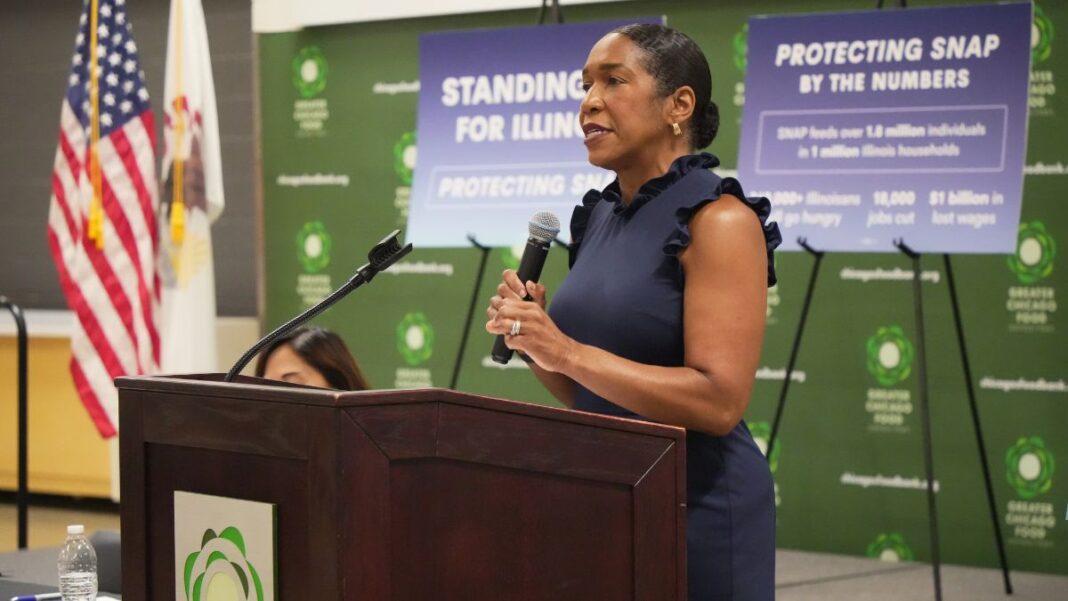Lt. Gov. Juliana Stratton hosted a roundtable at the Greater Chicago Food Depository to highlight how federal SNAP cuts threatened the well-being of Illinois families (Photo Credit: Tacuma R. Roeback).
For Natasha McClendon, a substitute teacher and mother of three, the newest federal spending bill signed by President Donald Trump will have a crippling effect on how they live and eat.
“This is going to be really hard on people like me,” McClendon said at a recent event hosted by the Greater Chicago Food Depository. “It’s heartbreaking to tell a nine and a 12-year-old that mom can’t buy the foods they like to eat.”
McClendon is one of over 340,000 Illinoisans expected to be impacted by sweeping cuts to the Supplemental Nutrition Assistance Program (SNAP), the result of what Trump dubbed his “Big Beautiful Bill”—a federal budget signed into law in 2025.
The bill dramatically increases work requirements, red tape and shifts financial burdens from the federal government to the states. In Illinois, advocates and public officials warn, the fallout could deepen food insecurity, crush local economies and undo decades of progress in the fight against poverty.
A Tide of Red Tape

Lt. Gov. Stratton (L) and Deputy Governor for Health and Human Services Grace Hou (Photo Credit: Tacuma R. Roeback).
Grace Hou, deputy governor for Health and Human Services in Illinois, broke down the numbers and implications.
“This bill adds layers of bureaucracy under the guise of cost savings,” Hou said. “The feds are abandoning their responsibility and pushing it onto us.”
The bill eliminates long-standing work requirement waivers for veterans, homeless individuals, and former foster youth, impacting an estimated 20,000 Illinoisans. It also expands requirements for so-called “able-bodied adults without dependents,” or ABAWDs, forcing them to prove at least 80 hours of monthly work to remain eligible for food assistance.
“People will get caught in the red tape, or become so disillusioned they give up entirely,” said Dulce Quintero, Secretary of the Illinois Department of Human Services. “Once someone loses benefits twice under these rules, they’re ineligible for SNAP for three years.”
The Human Cost

Natasha McClendon (foreground) shared her experience at a recent round table at the Greater Chicago Food Depository (Photo Credit: Tacuma R. Roeback).
For McClendon, the new rules ignore the unstable nature of part-time and substitute work.
“We don’t know what our hours are. We don’t know what our days are,” she explained. “I might not be working 20 hours a week, even if I want to.”
With her husband permanently disabled and household income limited, SNAP has helped keep the family afloat. “The food stamp benefits I receive are not enough to meet our household needs,” she said. “So I depend on my local food pantry at St. Sabina.”
A Strain on the Safety Net

Kate Maehr, CEO of the Greater Chicago Food Depository (Photo Credit: Tacuma R. Roeback).
Kate Maehr, CEO of the Greater Chicago Food Depository, says the emergency food system is already stretched beyond capacity.
“More than 200,000 households a month are showing up at largely volunteer-led, community-based organizations,” she said. “They are tired. They are performing miracles every day. But they cannot replace the safety net.”
Steve Ericson of Feeding Illinois added that rural communities will be hit especially hard.
“Seven of the highest poverty counties in Illinois are rural,” he said. “In downstate areas, over 50% of grocery store sales come from SNAP purchases. That math just doesn’t work if you cut benefits.”
Ripple Effects on Health, Business, and Local Economies

The audience at the roundtable at the Greater Chicago Food Depository (Photo Credit: Tacuma Roeback).
The economic impact of SNAP cuts doesn’t end with individuals. Rob Karr, CEO of the Illinois Retail Merchants Association, emphasized that every dollar spent on SNAP generates $1.50 in economic activity.
“These cuts will devastate independent grocers, especially in underserved areas,” Karr said. “Grocery stores already operate on razor-thin margins. This could force more of them to close.”
Elaine Waxman, a senior fellow at the Urban Institute, stressed that food insecurity is also a public health crisis. “SNAP recipients have much lower healthcare costs than those who don’t receive benefits—by up to $1,400 a year,” she said. “Cutting SNAP and Medicaid at the same time will only worsen outcomes.”
She also pointed out that SNAP has never covered the full cost of a low-cost meal in any Illinois county. “Even at its maximum, SNAP has always fallen short. These cuts only widen the gap.”
Impact on Farmers and Food Access
Connie Spreen of Experimental Station warned that SNAP cuts will gut programs like Link Match, which helps low-income families afford fresh produce at farmers markets.
“SNAP users are also feeding our local food system,” she said. “Without these dollars, farmers and rural economies will suffer.”
According to Spreen, nearly 1.5 million dollars in fruits and vegetables were purchased last year through Link Match. “77.5% of SNAP recipients we surveyed said their health improved as a result,” she said. “That health, that productivity, contributes to our economy.”
“We Will Not Quietly Submit”

Roundtable participants at the Greater Chicago Food Depository (Photo Credit: Tacuma R. Roeback).
Lt. Gov. Juliana Stratton closed the event with a vow to resist.
“We fought hard to stop this from becoming reality. We raised our voices. We made calls. We begged Trump’s party not to pay for billionaire favors by taking food off the tables of vulnerable families,” she said. “But the cuts still came. And now it is our job to help pick up the pieces.”
“Know that we will not quietly submit to a future that forces our people to suffer,” she added. “We are with you, Illinois. Every step of the way.”



